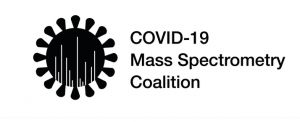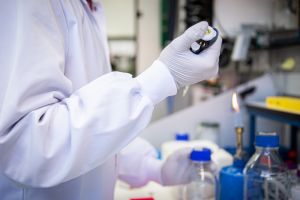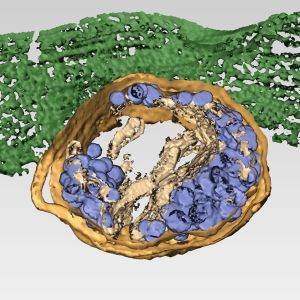
Investigadores del CNB-CSIC participan en la coalición internacional Covid19-MS para seguir los tratamientos y efectos del SARS-CoV2 en sangre de pacientes infectados

- La coalición COVID19-MS cuenta con más de 500 científicos de 18 países que compartirán datos sobre COVID-19 obtenidos mediante técnicas de espectrometría de masas que examinan la sangre en busca de biomarcadores para el mejor tratamiento de los pacientes.
La nueva coalición COVID-19 MS, coordinada desde la Universidad de Manchester, está formada por los principales expertos en espectrometría de masas del mundo. Su objetivo es la puesta en común de los avances que permitan refinar las aproximaciones experimentales y las opciones de tratamiento, determinar los requisitos de aislamiento y acelerar los requisitos de medidas en nuevos programas de desarrollo terapéutico tanto para COVID-19 como en futuras amenazas. El anuncio de la nueva coalición se ha hecho a traves de una carta publicada en la revista The Lancet.
Carlos Martínez Alonso, nuevo integrante del Comité Identificador del Consejo Europeo de Investigación (ERC)

Carlos Martínez Alonso, ex director del CNB, formará parte del Comité internacional de expertos que selecciona a los miembros del Consejo Científico del Consejo Europeo de Investigación (European Research Council).
Martínez Alonso es uno de los seis científicos de alto nivel nombrados la semana pasada por Mariya Gabriel, comisaria europea de Investigación, Innovación, Cultura, Educación y Juventud para integrar el Comité de Identificación que selecciona a los futuros miembros del Consejo Científico del ERC. El Consejo Científico del ERC es el órgano encargado de definir su estrategia y sus metodologías de financiación de la ciencia. Se compone de 22 destacados científicos y académicos que representan a la comunidad científica europea y promueven la investigación innovadora y la creatividad. Su mandato está limitado a cuatro años, renovables una única vez.
Alberto Fernández Oliva, ganador en la Zona CSIC del Concurso "Somos Científicos y Científicas, ¡sácanos de aquí!"
- Alberto Fernández Oliva, doctorando en el grupo de Estructura Celular del CNB, ha sido el ganador de la Zona CSIC del Concurso Somos Científicos y Científicas, ¡sácanos de aquí! gracias a los votos de los alumnos y alumnas de 18 centros educativos pertenecientes a municipios de la red de Ciudad Ciencia.
A través de los chats, los estudiantes han conocido en qué se centra su investigación. Alberto Fernández utiliza microscopios para descubrir cómo funcionan y cambian las células infectadas por un virus, y, de esta forma, selecciona nuevos medicamentos antivirales. Entre las numerosas preguntas que ha recibido, destacan: ¿Se puede extinguir un virus?, ¿de qué color es el ADN?, ¿por qué los virus, que no son seres vivos, son tan peligrosos para las personas?, ¿el aire está contaminado por el COVID-19? o, ¿cuál es el virus más peligroso que has estudiado?
Máxima prioridad en el CSIC para los proyectos contra el coronavirus
El CSIC recibe 250.000 euros de Ferrovial para impulsar la búsqueda de vacunas contra Covid-19

La financiación apoyará los proyectos de Luis Enjuanes e Isabel Sola, que busca un virus atenuado, y el de Mariano Esteban, que usa una proteína para activar la inmunidad.
El Consejo Superior de Investigaciones Científicas (CSIC) ha recibido 250.000 euros de Ferrovial para potenciar la búsqueda de una vacuna contra la pandemia de Covid-19. El fondo irá destinado al Centro Nacional de Biotecnología (CNB-CSIC) para apoyar dos proyectos de investigación para desarrollar vacunas: el que dirigen los virólogos Luis Enjuanes e Isabel Sola, para modificar genéticamente el SARS-CoV-2 y convertirlo en un virus atenuado que sirva como candidato a vacuna; y el que dirige el virólogo Mariano Esteban para utilizar una proteína del virus e incorporarla en otro virus que sirve de vehículo para estimular la respuesta inmune.
La presidenta del CSIC, Rosa Menéndez, ha agradecido este “importante impulso para reforzar la investigación de dos equipos destacados en la búsqueda de una vacuna segura y eficaz que pueda aplicarse para paliar los efectos de futuras epidemias de coronavirus. Ahora necesitamos explorar todas las vías que permitan que estos resultados de investigación básica lleguen a la sociedad, tras los necesarios ensayos clínicos. Esta donación nos va a permitir acelerar este proceso”
La donación de Ferrovial forma parte de del fondo Ferrovial Juntos COVID-19, destinado a equipamiento sanitario, investigación y ayuda social.
New call: JAE Intro SOMdM 2020 Scholarships at CNB-CSIC
NEW: 23rd JUNE Provisional list of applicants admitted and excluded
NEW: 9th JULY: Definitive list of applicants admitted and excluded
NEW: 22 JULY: ALLOCATIONS
Submissions are open for the new JAE Intro SOMdM 2020 Scholarships at CSIC Severo Ochoa Centres of Excellence and María de Maeztu Units of Excellence.
This call is open to students who are going to enroll in a University Master's Degree during the 2020/2021 academic year. Applicants must have completed a degree in the academic year 2018/2019 or later (check the exceptions in the Call bases) and credit an average grade equal to or greater than 8.00. Applications deadline is June 15, 2020.
Call bases can be found here
In this call, CNB-CSIC, offers up to 6 scholarships (one per department), and each one will be allocated with 7200 euros in nine monthly installments. For more information on the groups offered, check our list of departments.
The European Project MADONNA and Biofaction open a Call for Artists in Residence at the National Center for Biotechnology

The new edition of the “Artists in Residence” programme collaborates with the European projects MADONNA, NEWCOTIANA and SINFONIA offering four residences in various European laboratories for 4 to 6 weeks. The residences will start in Fall 2020 and will conclude in May 2021. Each artist will receive an stipend (funded by the European projects)up to 7000 € to cover travel, local expense, living allowance as well as (partial) support or the production and showcasing of the artistic prototype or finished work.
MADONNA, a European Union´s Horizon 2020 project coordinated by professor Víctor de Lorenzo at the CNB, participates in this new Biofaction call. In this area, two artist residencies are offered, one for the Cronin group at the Faculty of Chemistry at the University of Glasgow (United Kingdom) and the other for the Molecular Environmental Microbiology laboratory led by researcher Víctor de Lorenzo at CNB- CSIC.
Una herramienta del CNB-CSIC integra información de todo el mundo sobre la estructura atómica del SARS-CoV2
-
La aplicación web, denominada 3DBionotes-Covid-19, rastrea e integra fuentes de información internacionales sobre el SARS-CoV-2, agente causante de la pandemia
- Esta plataforma enmarca todos los datos en un entorno tridimensional a nivel atómico y los pone a disposición de la comunidad científica internacional
Investigadores del Consejo Superior de Investigaciones Científicas (CSIC) en el Centro Nacional de Biotecnología (CNB-CSIC) han puesto a disposición de la comunidad científica una herramienta de computación que rastrea bases de datos y pone en común múltiples fuentes de información sobre el coronavirus SARS-CoV-2, causante de la pandemia de Covid-19. Este nueva herramienta de análisis, denominada 3DBionotes-Covid, integra toda esa información en un entorno interactivo tridimensional a nivel atómico. Esta nueva aplicación pone de manifiesto el papel esencial de las infraestructuras de investigación del Foro Estratégico Europeo (ESFRI) y de la participación española en ellas, puesto que su desarrollo nace de la confluencia en el CNB-CSIC de dos de estas grandes infraestructuras, Instruct (en el marco de la Biología Estructural) y ELIXIR (en Bioinformática), de las que España es socio. La aplicación se encuentra disponible tanto desde el CNB-CSIC como desde los nodos españoles de Instruct y de Elixir.
Human reovirus hijacks lysosomes transforming them into viral factories
COOKIES POLICY
A cookie is a text file that is stored on your computer or mobile device via a web server and only that server will be able to retrieve or read the contents of the cookie and allow the Web site remember browser preferences and navigate efficiently. Cookies make the interaction between the user and the website faster and easier.
General information
This Website uses cookies. Cookies are small text files generated by the web pages you visit, which contain the session data that can be useful later in the website. In this way this Web remembers information about your visit, which can facilitate your next visit and make the website more useful.
How do cookies?
Cookies can only store text, usually always anonymous and encrypted. No personal information is ever stored in a cookie, or can be associated with identified or identifiable person.
The data allow this website to keep your information between the pages, and also to discuss how to interact with the website. Cookies are safe because they can only store information that is put there by the browser, which is information the user entered in the browser or included in the page request. You can not run the code and can not be used to access your computer. If a website encrypts cookie data, only the website can read the information.
What types of cookies used?
The cookies used by this website can be distinguished by the following criteria:
1. Types of cookies as the entity that manages:
Depending on who the entity operating the computer or domain where cookies are sent and treat the data obtained, we can distinguish:
- Own cookies: are those that are sent to the user's terminal equipment from a computer or domain managed by the editor itself and from which provides the service requested by the user.
- Third party cookies: these are those that are sent to the user's terminal equipment from a machine or domain that is not managed by the publisher, but by another entity data is obtained through cookies.
In the event that the cookies are installed from a computer or domain managed by the editor itself but the information collected by these is managed by a third party can not be considered as party cookies.
2. Types of cookies as the length of time that remain active:
Depending on the length of time that remain active in the terminal equipment can be distinguished:
- Session cookies: cookies are a type designed to collect and store data while the user accesses a web page. Are usually used to store information that only worth preserving for the service requested by the user at any one time (eg a list of products purchased).
- Persistent cookies: cookies are a type of data which are stored in the terminal and can be accessed and treated for a period defined by the head of the cookie, and can range from a few minutes to several years.
3. Cookies types according to their purpose:
Depending on the purpose for which the data are processed through cookies, we can distinguish between:
- Technical cookies: these are those that allow the user to navigate through a web page or application platform and the use of different options or services it exist as, for example, control traffic and data communication, identify the session, access to restricted access parts, remember the elements of an order, make the buying process an order, make an application for registration or participation in an event, use security features while browsing store content for dissemination videos or sound or share content via social networks.
- Customization cookies: these are those that allow the user to access the service with some general characteristics based on a predefined set of criteria in the user terminal would eg language, the type of browser through which you access the service, the locale from which you access the service, etc.
- Analysis cookies: they are those that allow the responsible for them, monitoring and analyzing the behavior of users of the web sites that are linked. The information gathered through such cookies are used in measuring the activity of web sites, application or platform and for the profiling of user navigation of such sites, applications and platforms, in order to make improvements function data analysis how users use the service.
Management tool cookies
This Website uses Google Analytics.
Google Analytics is a free tool from Google that primarily allows website owners know how users interact with your website. Also, enable cookies in the domain of the site in which you are and uses a set of cookies called "__utma" and "__utmz" to collect information anonymously and reporting of website trends without identifying individual users..
For statistics of use of this website use cookies in order to know the level of recurrence of our visitors and more interesting content. This way we can concentrate our efforts on improving the most visited areas and make the user more easily find what they are looking for. On this site you can use the information from your visit for statistical evaluations and calculations anonymous data and to ensure the continuity of service or to make improvements to their websites. For more details, see the link below privacy policy [http://www.google.com/intl/en/policies/privacy/]
How to manage cookies on your computer: disabling and deleting cookies
All Internet browsers allow you to limit the behavior of a cookie or disable cookies within settings or browser settings. The steps for doing so are different for each browser, you can find instructions in the help menu of your browser.
If you decline the use of cookies, since it is possible thanks to the preferences menu of your browser or settings, reject, this website will continue to function properly without the use of the same.
Can you allow, block or delete cookies installed on your computer by setting your browser options installed on your computer:
- For more information about Internet Explorer click here.
- For more information on Chrome click here.
- For more information about Safari click here.
- For more information about Firefox click here.
Through your browser, you can also view the cookies that are on your computer, and delete them as you see fit. Cookies are text files, you can open and read the contents. The data within them is almost always encrypted with a numeric key corresponding to an Internet session so often has no meaning beyond the website who wrote it.
Informed consent
The use of this website on the other hand, implies that you paid your specific consent to the use of cookies, on the terms and conditions provided in this Cookies Policy, without prejudice to the measures of deactivation and removal of cookies that you can take, and mentioned in the previous section.







